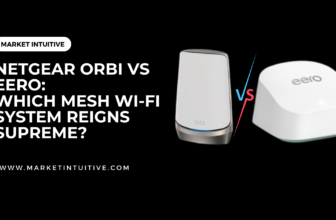Difference Between WiFi And Internet: How Do They Differ?

In today’s digital age, WiFi and the Internet are often used interchangeably, which confuses many people. So, what’s the difference between WiFi and Internet? While both are critical components of our online lives, they serve different purposes.
WiFi allows devices to link to the internet without any cables. And the Internet allows users to exchange information and communicate.
Today, I will dive deeper into the difference between WiFi and Internet, their functions, and how they work together to connect us to the digital world.
Difference Between WiFi And Internet: Introduction
WiFi and the internet are related but distinct concepts. WiFi enables devices to establish wireless connections to LAN or the internet. In contrast, the Internet is a vast network of interconnected computers and networks encompassing the world.
WiFi is a wireless technology that enables devices to establish connections within a restricted range, either to a local network or the internet. At the same time, Internet is a worldwide network infrastructure that facilitates global communication and data exchange among devices.
Understanding the difference between WiFi and the Internet is crucial in efficiently establishing and resolving network connections.
WiFi functions as a wireless network within a limited area, whereas the internet encompasses a global network that empowers you to implement suitable security measures for each network.
Comparison: Difference Between WiFi And Internet
Key Features | WiFi | Internet |
| Evolution | The development of IEEE 802.11 specifications by the IEEE committee, led by Vic Hayes in 1997, resulted in the invention of WiFi. | The Internet’s inception dates back to 1969 when the Advanced Research Project Agency began developing. |
| Concept | WiFi is a network that enables wireless connectivity between devices nearby, allowing them to share access to the internet through hotspot connections. | The Internet is a vast interconnected system of networks where computers interact with each other through Internet Protocol. |
| Connection | It is possible to connect wireless devices through WiFi without requiring them to have internet access. | It is optional to have WiFi for all computers to access the Internet. |
| Transmission | Data transmits through radio frequency waves in WiFi. | Data transmission among different computers facilitates through a pre-established TCP/IP protocol on the Internet. |
| Networking Technology | This technology facilitates wireless networking by transmitting and receiving signals between nearby devices, enabling them to access the Internet. | This technology enables devices to be connected worldwide in telecommunications networking. |
| Device | You must have both DSL devices and routers to establish a WiFi connection. | One requires modems, routers, and switches to develop a connection with the internet or LAN servers. |
| Function | WiFi is one of the methods to access the Internet. | Unlike WiFi, the Internet serves as a communication language for computers. |
| Operation | A single router-based WiFi network has a limited range of no more than 50 to 100 metres. | The accessibility of 3G or 4G mobile internet can span several kilometres, even up to tens of kilometres, and is available in almost every location with a mobile connection. |
| Usage | Radio frequency waves send and receive information. | Using a predetermined set of regulations established by the TCP/IP suite is common on the Internet. |
| Major Difference | It’s possible to link wireless gadgets to WiFi. | It is possible to connect computers worldwide without the need for WiFi when using the internet. |
Difference Between WiFi And Internet: Defining WiFi And Internet

WiFi, a wireless connection facilitated by a router, enables devices to connect to the internet. It operates as a network that conforms to the 802.11 standards and allows wireless-enabled devices to communicate via radio waves. By utilising radio frequency waves, WiFi delivers high-speed internet connections.
WiFi finds applications in residential and commercial settings to establish wireless connections among computers and devices. Its operation is confined within a restricted range, usually a few hundred feet. To establish a connection, both a WiFi-enabled device and a wireless router or access point are necessary.
The Internet is a global network encompassing computer systems worldwide, connecting them through the Internet Protocol suite.
An internet connection needs to be linked to the internet, which can be established through different methods such as WiFi, Ethernet cables, cellular networks, or satellite connections.
While WiFi serves as one of the means to have internet access, WiFi is not synonymous with the Internet itself.
Difference Between WiFi And Internet: How WiFi And Internet Work Together
WiFi is a medium for connecting to the internet by establishing a wireless link between devices and a local network or router. It allows devices like smartphones, laptops, and tablets to connect to a WiFi network, usually provided by a wireless router or access point.
After establishing a connection to a WiFi network, devices can access the internet by establishing a connection between the local network and an internet service provider. The ISP acts as the gateway to the internet, furnishing the essential infrastructure and connectivity required to reach online resources, websites, and services.
In this manner, WiFi functions as a wireless bridge, enabling devices to transmit data to and from the internet. It facilitates internet access without relying on physical cables or direct connections.
Routers and modems have vital roles in establishing device connectivity to the internet. A router functions as a central hub, facilitating communication among multiple devices within your local network and extending connectivity beyond. It directs network traffic, ensuring efficient data flow between devices.
A modem, derived from a modulator-demodulator, serves as a device that facilitates data transmission between your internet service provider and your home or business network.
Modems and routers collaborate harmoniously to deliver connectivity, allowing devices to access the internet seamlessly. Modems establish the link connecting your local network with the ISP’s network. At the same time, routers oversee data flow among devices within your network and enable communication with the internet via the modem.
Difference Between WiFi And Internet: Speed

The speeds of WiFi standards and internet connection types can exhibit substantial variations:
- WiFi 4 – The average speeds of Wi-Fi 4 can range from 150 Mbps to 600 Mbps, depending on factors such as the particular implementation and equipment quality.
- WiFi 5 – WiFi 5 offers average speeds ranging from 500 Mbps to 1 Gbps or higher. The actual speed can depend on factors such as the number of antennas, channel width, and various other considerations.
- WiFi 6 – WiFi 6 delivers even greater speeds. Average speeds can vary between 1 Gbps to 10 Gbps or beyond, contingent on the network infrastructure and the devices’ capabilities.
- Broadband – Broadband connections consist of FTTC (Fibre to the Cabinet), having a 76 Mbps download speed & 19 Mbps upload speed, and FTTP (Fibre to the Premises), having a 1 Gbps download speed & 40 Mbps upload speed.
- Fibre – Fiber-optic connections are renowned for their ability to provide high-speed connectivity. The average speeds for fibre connections can vary from 100 Mbps to 1 Gbps or even higher, depending on the service provider and the chosen plan.
- 4G – 4G mobile networks typically provide average speeds ranges upto 100 Mbps, depending on network coverage, congestion levels, and device capabilities.
- 5G – 5G networks offer extremely fast speeds ranging from 100 Mbps to several Gbps. The actual speeds are influenced by network deployment, frequency bands utilised, and other considerations.
It is crucial to acknowledge that these speed ranges are generalisations, and the actual speeds can differ based on various factors. These factors may include network conditions, equipment quality, proximity to the router or tower, and the selected service plan.
The choice of WiFi standard and internet connection type can significantly impact the user experience.
Difference Between WiFi And Internet: Performance
Latency, signal strength, and congestion are crucial elements that greatly influence the performance and user experience of different internet connection types, including WiFi. These factors affect online activities like streaming, gaming, and video conferencing.
Considering these factors is essential when choosing between various internet connection options, as they significantly impact the overall user experience, encompassing speed, stability, and reliability.
Latency denotes the time delay in transmitting data between devices and the internet. Lower latency is desirable, enabling quicker response times and seamless real-time communication.
The signal strength between the device & the access point or router is paramount in establishing a stable and dependable connection.
Network congestion transpires when there is a substantial influx of data traffic, leading to reduced speeds and potential connection complications.
Difference Between WiFi And Internet: Price

The cost of WiFi equipment and internet service providers in the UK can fluctuate based on various factors, such as the particular equipment or service package selected.
The price of WiFi equipment in the UK can differ based on elements such as brand, model, features, and the number of supported devices. The price range for Wi-Fi equipment typically begins around £20 for basic routers and can reach several hundred pounds for advanced mesh systems or premium models that offer advanced features.
The cost of internet service providers in the UK varies depending on factors like connection type, speed, data allowances, and additional services provided. Standard packages with different speeds and data limits for broadband internet service can range from around £20 to £50 per month.
Compared to standard broadband, fibre optic internet service typically delivers higher speeds and is priced at a relatively higher range. Fibre optic internet costs can range from approximately £30 to £60 per month, depending on speed and data allowances.
Mobile broadband in the UK can be found within a price range of roughly £10 to £30 per month, with variations depending on the data allowances and network speed (4G or 5G).
Please remember that these price ranges are approximate and subject to variation based on the specific location, promotional offers, bundled services, contract terms, and individual offerings from internet service providers.
Conduct thorough research and compare various providers and packages to identify the most suitable option that aligns with your requirements and budget.
Difference Between WiFi And Internet: Range And Connectivity
The range of WiFi networks can vary based on factors such as the WiFi standard, equipment type, environmental conditions, and potential interference. WiFi networks generally have a typical range of approximately 100 to 300 feet indoors and can extend to several hundred feet in open areas like outdoor spaces.
You can extend the typical range of WiFi networks by using WiFi Range Extenders. These WiFi extenders boost and retransmit the WiFi signal, effectively expanding the network’s coverage area. In addition, you can use Mesh WiFi Systems and Access Points to extend the typical range of WiFi networks.
The range and connectivity of internet connection types can vary due to their inherent characteristics. Wired connections typically offer greater stability and consistency, while wireless connections like WiFi and cellular networks provide more flexibility and convenience.
When selecting a connection type, it is crucial to consider the various factors affecting its range and connectivity. These considerations are essential in choosing the most suitable connection type to meet your needs.
Difference Between WiFi And Internet: Security

Security is a vital consideration regarding WiFi networks and internet connections. Protecting your WiFi network to prevent unauthorised access and safeguard your data is crucial. Setting a strong, unique password for your WiFi network is recommended to deter unauthorised users from connecting to it.
VPNs offer privacy and anonymity by routing internet traffic through a secure server, making it hard for others to intercept your data.
Maintaining the security of your WiFi router, devices, and software is essential, which can be achieved by regularly updating them.
Keep devices & software up to date. This helps address security vulnerabilities and ensures you have the latest security features and protections.
Similar Tutorials Types to Check Out
- 4G Vs WiFi Speed: Why Your WiFi Is Slower Than Your Mobile Data?: 4G and WiFi are excellent options for staying connected, but which is faster, 4G vs WiFi speed? Today, I will provide an in-depth exploration of the distinctions between 4G Vs WiFi speed, intending to help you make an informed selection
- Why Is Your 4G Slow? 9 Possible Reasons And Solutions: Have you ever experienced frustration with your 4G connection? Have you ever asked why is your 4g slow? Today, I will discuss the potential causes of why your 4g is slow and how to identify and fix them
- Why Does My Internet Speed Fluctuate?: Don’t worry if you’re trying to figure out why does my internet speed fluctuate. I’ve got you covered. You can solve the issue whether you’re using WiFi or an Ethernet cable
- How To Connect To Internet Without ISP?: You can connect to internet without ISP. Today, I will share a guide that will show you how to connect to internet without ISP on your PC and other devices
FAQs (Frequently Asked Questions) On The Difference Between WiFi And Internet
1. Can you have WiFi without the internet?
A wireless router can be utilised even without an Internet connection, regardless of whether wired or wireless.
2. Which is better, WiFi or the internet?
An Ethernet is more secure than a WiFi connection because it requires a device’s physical connection to the network to access data. In contrast, data transmitted over a WiFi network can be intercepted more easily as it travels through the air.
3. Why do I have WiFi but no internet?
Various factors could lead to this issue, such as a malfunctioning WiFi adapter in your computer, an outage in your internet service provider, or an incorrect internet protocol address assigned to your computer.
Conclusion: Difference Between WiFi And Internet
Wireless network technology, known as WiFi, enables communication between computers and devices capable of wireless connectivity through radio waves. At the same time, the Internet refers to a vast collection of interconnected networks that allow computers to exchange information through Internet Protocol.
The Internet is a challenging platform to govern and manage because of its immense magnitude and intricate nature. Aside from being a carrier of information, it is also a means of communication and can bring people together.
WiFi enables devices to link to the internet with the help of a router. It is generally used in homes and small businesses to provide high-speed internet connectivity.
While connecting to the internet via WiFi is free, the lack of security and privacy concerns can be considered a downside.
I hope today’s article on the difference between WiFi and Internet sounds helpful!






